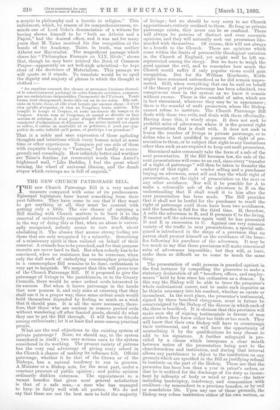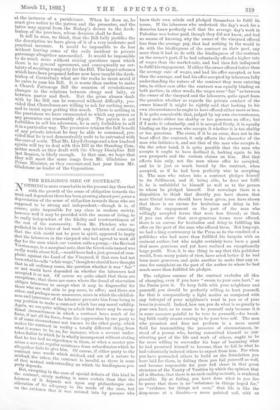THE NEW CHURCH PATRONAGE BILL. T HE new Church Patronage Bill
is a very modest measure compared with some of its predecessors. Episcopal legislators have learnt something from their past failures. They have come to see that if they want to get anything at all, they must be content with getting only a little. The one chance of carrying a Bill dealing with Church matters is to limit it to the removal of universally recognised abuses. The difficulty in the way of doing this is that, when an abuse is univer- sally recognised, nobody seems to care much about abolishing it. The abuses that arouse strong feeling are those that are only recognised by a minority. Something of a missionary spirit is then enlisted on behalf of their removal. A crusade has to be preached, and for that purpose recruits are never hard to find. But when nobody has to be convinced, when no resistance has to be overcome, when only the dull work of embodying commonplace principles in a commonplace Bill remains to be done, enthusiasm is very apt to languish. We suspect that this will prove true of the Church Patronage Bill. If it proposed to give the patronage of livings to the parishioners, or to the County Councils, there would be some ardent souls interested in its success. But when it leaves patronage in the hands that now possess it, and only aims at ensuring that they shall use it in a proper way, these same ardent souls would hold themselves degraded by feeling so much as a wish that it should pass. It is all the more necessary, there- fore, that those who are content to remove proved evils without wandering off after fancied goods, should do what they can to get the Bill through. It will have no friends among enthusiasts ; let it at least find some among practical people. What are the real objections to the existing system of private patronage ? None, we should say, to the system considered in itself ; two very serious ones to the system considered in its working. The present variety of patrons has the very real advantage of giving every school in the Church a chance of making its influence felt. Official patronage, whether it be that of the Crown or of the Bishops, has a natural tendency to run in grooves. A Minister or a Bishop acts, for the most part, under a constant pressure of public opinion ; and public opinion ordinarily dislikes extremes. The appointment to a vacant benefice that gives most general satisfaction is that of a safe man,—a man who has managed to keep in fairly well with all parties. We do not say that these are not the best men to hold the majority of livings ; but we should be very sorry to see Church appointments entirely confined to them. So long as private patronage exists, they never can be so confined. There will always be patrons of distinct and even eccentric opinions, and they will naturally seek out presentees like- minded with themselves. Of course, this will not always be a benefit to the Church. There are opinions which come within the limits of permissible theological variation in the Church of England, yet might well be left un- represented among the clergy. But we have to weigh the good against the evil, and to remember how much the Church would suffer if only popular views could gain recognition. But for Sir William Heathcote, Keble might have remained unbeneficed as he did remain unpro- moted. Still, when everything that can be said on behalf of the theory of private patronage has been admitted, two conspicuous vices in the system as we know it remain without excuse. There is the scandal of sales, which are in fact simoniacal, whatever they may be in appearance ; there is the scandal of unfit presentees, whom the Bishop cannot refuse to institute. The Church Patronage Bill deals with these two evils, and deals with them effectually. Having done this, it wisely stops. It does not seek to prohibit sales of advowsons where it is the general right of presentation that is dealt with. It does not seek to lessen the number of livings in private patronage, or to define who is best qualified to possess the right of pre- sentation to them, or to subject that right to any limitations other than such as are required to keep out unfit presentees.
Siinoniacal sales commonly take the form of a sale of the next presentation. If the Bill becomes law, the sale of the next presentations will come to an end, since every "transfer of a right of patronage" will then be taken to transfer the entirety of that right. A vendor selling and a purchaser buying an advowson, must sell and buy the whole right of presentation, not the right of presentation on the next or any other avoidance. Nor will it be possible for A to make a colourable sale of the advowson to B on the understanding that B shall resell it to him after the next presentation has been made. The Bill provides that it shall not be lawful for the purchaser to resell the right of patronage until there have been two avoidances, and the benefice is full for the third time. If, therefore, A sells the advowson to B, and B presents C to the living, B cannot sell the advowson again until he has presented D and E in succession to C. Against one very common variety of the traffic in next presentations, a special safe- guard is introduced in the shape of a provision that no patron shall present himself on the avoidance of the bene- fice following his purchase of the advowson. It may be too much to say that these provisions will make simoniacal sales of advowsons impossible ; but they will, at least, make them so difficult as to come to much the same thing.
The presentation of unfit persons is guarded against in the first instance by compelling the presentee to make a statutory declaration of all "benefices, offices, and employ- ments " held by him since his ordination as a deacon. In this way the Bishop will be able to trace the presentee's whole ecclesiastical career, and to make such inquiries as he thinks necessary into his conduct, whether as curate or incumbent. In the next place, the presentee's testimonial, signed by three beneficed clergymen, must in future be countersigned by the Bishop of the diocese in which each of the three is beneficed. It is obvious that this provision will make men shy of signing testimonials in favour of men about whom they know either too little or too much. They will know that their own Bishop will have to countersign their testimonial, and so will have the opportunity of neutralising it by the qualifications he may choose to add to - his signature. A further safeguard is pro- vided by a. clause which interposes a clear month between notice of the presentation being sent to the churchwardens and institution, and during that interval allows any parishioner to object to the institution on any grounds which are specified in the Bill as justifying refusal to institute on the part of the Bishop. These are that the presentee has been less than a year in priest's orders, or that he is unfitted for the discharge of his duty as incum- bent by infirmity of body or mind or purse—the latter including bankruptcy, insolvency, and composition with creditors—by misconduct in a previous benefice, or by evil or scandalous life. Upon any one of these grounds, the Bishop may refuse institution either of his own motion, or at the instance of a parishioner. When he does so, he must give notice to the patron and the presentee, and the latter may appeal from the Bishop's decree to the Arch- bishop of the province, whose decision shall be final. It will be seen, we think, that the Bill fully justifies the the description we have given of it of a very moderate and practical measure. It would be impossible to do less without leaving some of the evils incident to private patronage altogether unremedied. It would be impossible to do much more without raising questions upon which there is no general agreement, and consequently no cer- tainty of securing a majority for the Bill. The larger schemes which have been proposed before now have taught the Arch- bishop of Canterbury what are the rocks he must avoid if he cares to pass his Bill. It is worse than useless to make a Church Patronage Bill the occasion of revolutionary changes in the relations between clergy and laity, or between pastor and flock. But the gross abuses dealt with by the Bill can be removed without difficulty, pro- vided that Churchmen are willing to ask for nothing more, and to insist upon getting this much. There is nothing in the provisions we have enumerated to which any patron or any presentee can reasonably object. The patron is not forbidden to sell his advowson, he is only forbidden to sell it in a particular way. The presentee retains the full benefit of any -private interest he may be able to command, pro- vided that he is not demonstrably unfit to be entrusted with the cure of souls. That Mr. Lloyd-George and a few kindred Spirits will try to deal with this Bill in the Standing Com- mittee much as they dealt with the Clergy Discipline Bill last Session, is likely enough. In that case, we hope that they will meet the same usage from Mr. Gladstone as Prime Minister, as they encountered last year from Mr. Gladstone as leader of the Opposition.



































 Previous page
Previous page